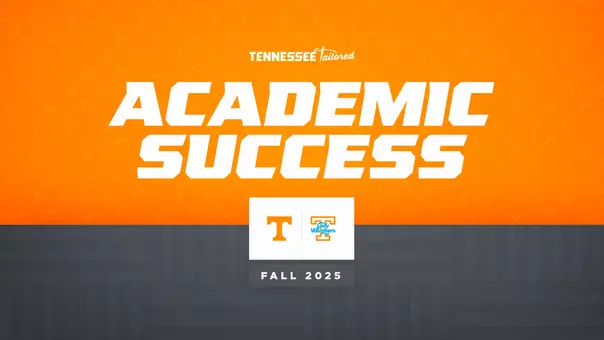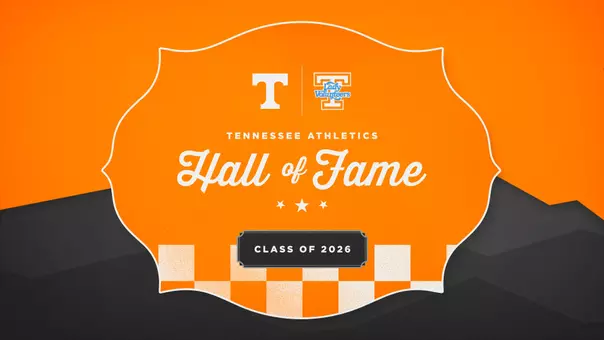University of Tennessee Athletics

TENNESSEE ANNOUNCES GRADUATION SUCCESS RATE FOR 1996-99 FRESHMAN CLASSES
November 09, 2006 | General
Nov. 9, 2006
The University of Tennessee men's and women's athletics departments announced graduation success rates for student-athletes who entered the university between 1996 and 1999 on Thursday.
Last year, the NCAA rolled out a new graduation success rate (GSR) calculation to measure the academic success of student-athletes at NCAA member institutions. The graduation success rate for UT student-athletes in the 1996-99 cohorts is 73 percent, which is comparable to the general population at the university.
The GSR allows institutions to add transfer students on scholarship that fit into the 1996-99 freshmen class and delete those students that choose to leave and are academically eligible according to Progress Toward Degree Requirements.
The University of Tennessee already had an internal system in place to measure the academic success rate of its student-athletes. The success rate is similar to the GSR, but does not take out students based on transfer. Rather it looks at all scholarship student-athletes in the 1996-99 freshmen class and then calculates the rate based on their eligibility to be a student at the University of Tennessee. Instead of removing students from the calculation based on leaving the university, which would include athletes who leave to pursue professional careers or transfer to another college or university, it simply looks at the percent of students that were eligible to be students at the University of Tennessee.
The academic success rate for this group was 94.9 percent, meaning 94.9 percent of the 1996-99 freshmen scholarship student-athletes were eligible to return to the university and complete their degrees.
"I am pleased with the success our students have in the classroom," said Eric Brey, Director of the Thornton Center. The new graduation success rate is a better indicator than the federal rate of the academic success our students have. The Thornton Center staff works hard to help our students move toward graduation."
Women's athletics director Joan Cronan added, "I am very proud of the accomplishments our student-athletes have made. The Thornton Center staff has done a great job keeping our student-athletes on track to graduate."
The university encourages former athletes who left in good standing to return to the university to achieve their degrees. The Renewing Academic Commitment (RAC) Program works with former student-athletes by assisting them with advice on degree requirements remaining, course scheduling, tutoring, employment and internship opportunities offered through the CHAMPS/Life Skills Office, and use of the Thornton Center for their everyday needs.
"The RAC program has been a great way for former athletes to return to school and finish their degree," said Mike Hamilton, men's athletics director.
There currently are more than 20 former student-athletes working with the RAC Program. In 2005-06, there were two graduates in the RAC Program.
A key focus for the UT athletics programs is to graduate student-athletes and prepare them for real-world experiences. In 2001, the University of Tennessee opened the Thornton Athletics Student Life Center to provide student-athletes with superior academic support programs and personal and career development assistance. Since the creation of the Thornton Center, Tennessee's student-athletes have achieved increasing academic success:
-- In 2005-06, 88 current and former Vols and Lady Vols graduated from the University of Tennessee, continuing Tennessee's athletics commitment to excellence in the classroom. This group boasts 47 SEC honor roll and 71 Thornton Athletics Student Life Center honor roll recognitions.
-- In the fall of 2005, 243, or 53 percent, of UT's student-athletes achieved a GPA of 3.0 or higher. In the spring of 2006, 242 student-athletes achieved a GPA of 3.0 or higher.
-- Twenty former student-athletes have returned to earn their bachelor's degree through the RAC program since fall 2003.
With the recent changes to NCAA rules for academic progression, the role of the Thornton Center is even more important. The new academic progress towards degree requirements require a student-athlete to complete various percentages toward degree requirements, specific grade-point averages, and other requirements to remain eligible to compete.
"The Thornton Center has been very active in the NCAA's academic progression discussions and has put in place a great framework to make sure our athletes stay on track," Hamilton said. "If our student-athletes aren't winning academically, they won't be competing."
















